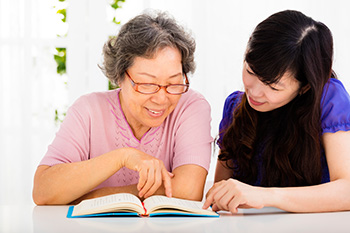It's easy to get answers about health and nutrition! Just send your question by email to [email protected] and Dr. Harlan will respond to selected questions of general interest. Answers will be posted in the Ask Dr. Gourmet newsletter (sign up now!) and archived in the Ask Dr. Gourmet section of the website.
Please note that the Ask Dr. Gourmet feature is restricted to questions regarding food and nutrition. Due to the many questions we receive, not all questions may be answered. For more specific questions about your individual health, please contact your doctor. About Timothy S. Harlan, MD, FACP, CCMS | Terms of Use | Privacy Policy
Ask Dr. Gourmet
How can my elderly grandmother manage her low-sodium diet?
My husband's grandmother was recently hospitalized for heart related issues. When she was released from the hospital, she was told to live on a low sodium / sodium free diet. She lives alone out of state, has no "helpful" family nearby, and is legally blind. Sending her a standard text cook book is not an option. She does very little cooking. My understanding is that she eats primarily frozen foods, deli foods, and canned foods. Do you have any suggestions as to what types of easy to prepare foods I can recommend to her?
Dr. Gourmet Says...

I find this to be a common issue with my elderly patients. Often they don't want to take the time to cook just for themselves and it can be a challenge for them to even get to and from the grocery store. It is possible for her to eat healthy and control the amount of sodium in her diet with just a few simple changes.
For breakfast a healthy cereal like Shredded Wheat, Raisin Bran or Cheerios is a good choice. She should choose skim or 1% milk. Slicing fruit over her cereal or having a piece of fruit with her breakfast as well as for snacks throughout the day is important for a healthy diet.
Alternatively, a scrambled or poached egg with a slice of whole wheat toast is also a good choice. She should use a non-stick pan for the eggs. Having her use 1/8 teaspoon of salt for her eggs is just right. She should choose a healthy spread like Promise Buttery Spread Light or Take Control Light Spread for her toast.
A half of a sandwich for lunch using one of the lower sodium deli meats would be fine for her. Healthy Choice is a good brand for this. Likewise, there are a number of good lower sodium soups that make a good lunch. She could make a salad and dress it with a good quality extra virgin olive oil and balsamic vinegar.
For dinner there are a lot of good choices in the freezer case. She should look for the ones with the least sodium - ideally under 500 milligrams of sodium per serving.
She should keep a good quality pasta sauce on hand. Many are lower in sodium and make for a great meal with pasta and a vegetable on the side. Watch out for added sugars, as many pasta sauces have added sugars.
As far as her use of canned foods, they are as a rule higher in salt. She needs to learn how to read the Nutrition Facts label to help her figure out how much sodium is in the food she is purchasing. Fortunately, there are a lot of low-sodium canned foods on the market now. Frozen vegetables are usually lower in salt than canned and are often higher in nutrients.
While it might seem like a shameless plug, my book It's Heartly Fare was written with patients like your husband's grandmother in mind. It's very reasonably priced and you can order this direct from the publisher for just $4.50 plus shipping.
I hope that these ideas can help you get her started on eating healthier.
Thanks for writing.
Timothy S. Harlan, MD, FACP, CCMS
Dr. Gourmet
